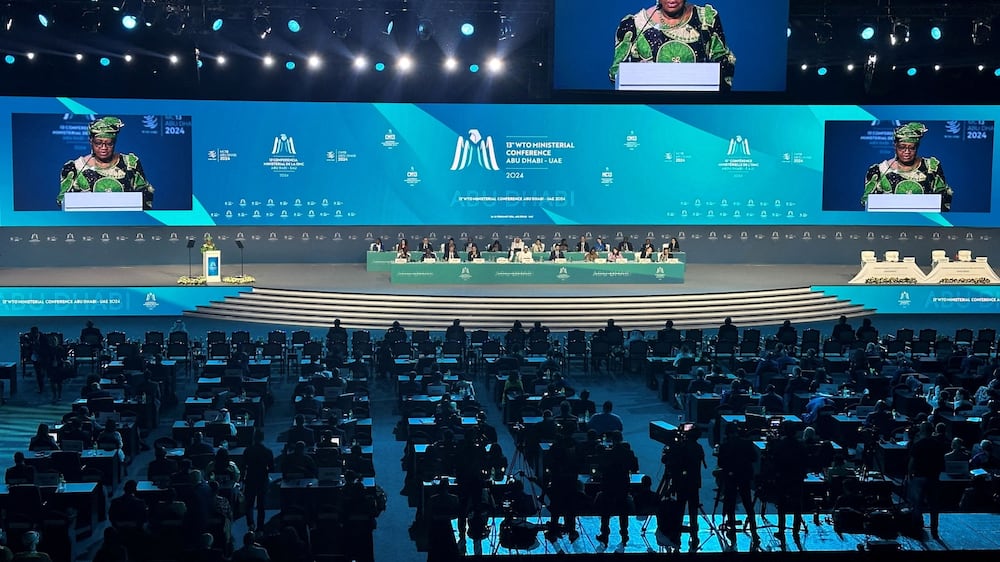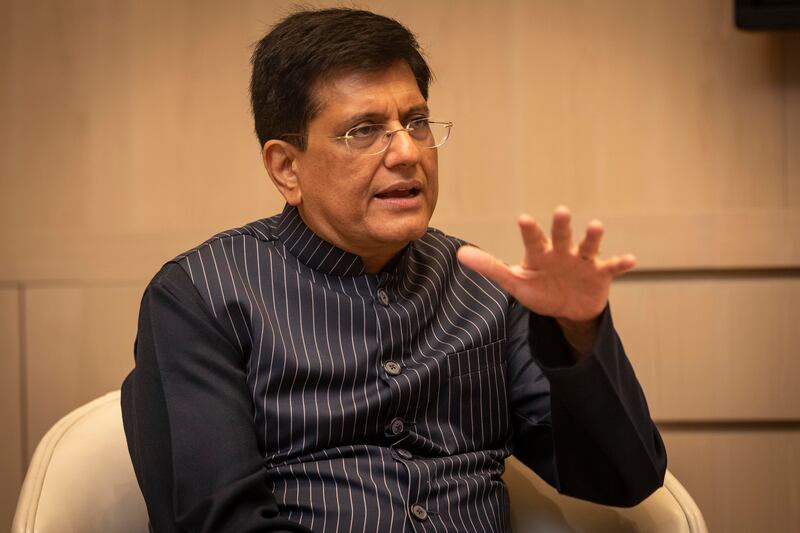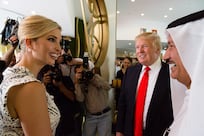India, which is seen as the main opposer for key trade agreements on fisheries and agriculture subsidies, is keeping “an open mind” during the talks at the World Trade Organisation, the country’s Commerce and Industry minister has said.
However, Piyush Goyal emphasised a reformed trade dispute settlement system at the WTO was necessary to ensure a fair global trading system.
“We have an open mind for everything, last time [at the previous ministerial conference] also, we played the consensus builders' approach and the bridging approach,” Mr Goyal told The National in an interview on the sidelines of the WTO's 13th Ministerial Conference in Abu Dhabi on Wednesday.
Member countries of the WTO are meeting in the UAE capital as they try to iron out differences and reach a consensus on topics from cutting fishing subsidies to extending the existing moratorium on e-commerce transactions and pushing for WTO reforms to improve its trade dispute settlement system.
India, along with other countries including China and Indonesia, is opposing curbing fishery subsidies to protect local fishing community. The world’s fifth-largest economy is also against extending the existing moratorium on e-commerce as it looks to raise revenue and support domestic industries.
The talks began on Monday and are scheduled to conclude on Thursday, with many countries presenting their viewpoints on some of the issues impacting global trade and ways to boost commercial activity across continents. However, the talks may run over time.
Mr Goyal called for the restoration of an appellate body – the judicial arm of the dispute settlement system – that will help resolve trading disputes and generate confidence in the global trade organisation.
“The actions and decisions taken by the WTO for so many years should be adjudicated in a fair and balanced manner. And that can only happen once the appellate body is in place,” he said.
He added that the body would be helpful in solving disputes between members if they had not met their commitment or failed to fulfil the mandate already agreed upon in the previous meetings.
India also issued a statement on Wednesday, calling for the restoration of the appellate body to solve trade disputes among the member countries.
WTO’s dispute resolution “system is the bedrock of an equitable, effective, secure and predictable multilateral trading system”, it said.
The WTO is seeking to push a package of reforms to improve its trade dispute settlement system and overcome a four-year impasse on the appointment of new judges. Its court has not functioned since the US opposed a new judge's appointment, leaving trade disputes worth billions of dollars unresolved.
As the US blocked appointments to the WTO’s appellate body, the second-tier group to which any party in a dispute case can lodge an appeal, the process of dispute settlement has been gutted.
India said the appellate body had not been functioning since December 2019, due to the blocking of the appointment of its members by the US and this has called into question the "WTO’s overall credibility and the rules-based trade order it upholds".
“It’s important that we bring the appellate body in place. It's important for the very confidence that the WTO needs to generate in its trading partners, that whatever mandates are discussed and decided will be delivered,” Mr Goyal said.
WTO countries' ministers looks to future in Abu Dhabi

He added that India-UAE trade ties are strengthening following the signing of the comprehensive economic partnership agreement two years ago.
“There's only a one-way street to the UAE-India partnership and that's upwards, bigger, better and good for both countries," Mr Goyal said.
“We have absolutely no doubt that our partnership with the UAE is one of the most important for India, and in the years to come, we will strengthen this even further.”
Bilateral non-oil trade between the UAE and India reached $50.5 billion in the first 12 months of the signing of the Cepa, marking a 5.8 per cent annual increase.
The two countries are aiming to double their non-oil trade to $100 billion by 2030.
The bilateral trade in 2024 is expected to surpass last year's levels, Mr Goyal said, without disclosing the total value of goods traded between India and the UAE last year.






